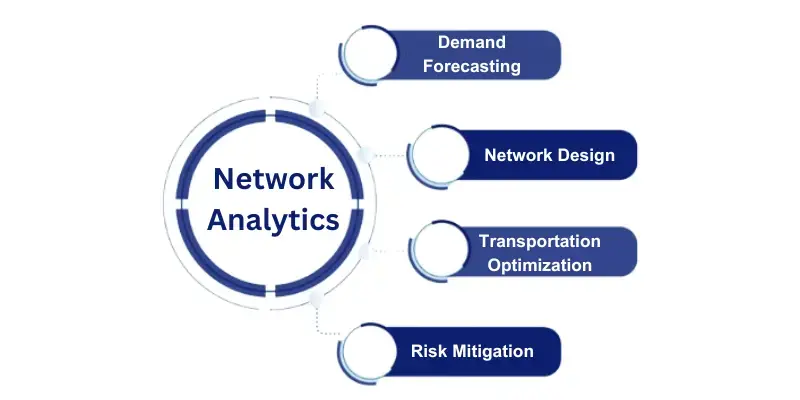The modern supply chain is a complex symphony of production, distribution, and sales, ensuring products seamlessly flow from raw materials to customer doorsteps. Products must flow seamlessly from raw materials to customer doorsteps, navigating a network of suppliers, warehouses, and distributors. But disruptions that happen are not uncommon. Unexpected delays, stockouts, or skyrocketing shipping costs can throw the entire system out of whack. This is where supply chain optimisation occurs, and business analyst skills become the secret weapon.
This blog dives into Network Analytics, a powerful tool within Business Analytics that acts as the supply chain’s secret weapon. We’ll explore how network analytics illuminates bottlenecks, optimizes resource allocation, and helps businesses navigate the complexities of the global marketplace. With this knowledge, you’ll gain insights into how business analyst skills can revolutionise the supply chain, ensuring timely deliveries, reduced costs, and, ultimately, happy customers. Explore MBA Offering Colleges in Chennai to find programs that equip you with the knowledge and expertise needed to thrive in this evolving landscape.
Challenges of Traditional Supply Chains
Traditional supply chains often siloed and reliant on intuition, need help navigating the complex web of interdependent activities. Limited insight into inventory levels, opaque transportation costs, and a lack of foresight into future demand all contribute to inefficiencies:
- Excessive inventory leads to storage costs and product obsolescence.
- Delayed deliveries erode customer satisfaction.
- Ballooning transportation expenses eat into profits.
Business analysts play a crucial role in optimising these challenges. With solid data analysis and strong business analyst technical skills, communication, and problem-solving skills, business analysts can bridge the gap between market demands and technical solutions. Business analyst salary reflects this critical function, with experienced professionals earning competitive salaries.
If you’re interested in this field and seeking a strong foundation, consider pursuing an MBA in Business Analytics in Chennai. These programs can equip you with the business analyst technical skills like data mining and business acumen to excel in this rewarding field.
What is Network Analytics?
Network analytics disrupts the status quo by providing a holistic view of the entire network. It is the process of leveraging data to gain insights into the intricate connections within a supply chain network. It is a digital map that tracks every movement of goods, pinpointing bottlenecks, inefficiencies, and potential risks.
Using business analyst skills to analyse this data, network analytics empowers businesses to:
Demand Forecasting
Network analytics accurately predicts future demand by analysing historical sales data, customer trends, and external factors. This allows businesses to:
- Prevent stockouts and associated costs.
- Plan production schedules effectively.
To optimise inventory levels and streamline operations, strong business analyst skills can further enhance forecasting capabilities.
Strategic Network Design
Business analyst skills are pivotal in strategic network design. Network analytics assesses the optimal placement of warehouses, distribution centres, and production facilities. It considers a multitude of variables to design a network that minimises distance and maximises delivery speed, leading to significant cost savings and timely fulfillment.
Transportation Optimization
Fuel costs, route planning, and carrier selection significantly impact the bottom line. Network analytics tackles these challenges by:
- Identifying opportunities for route consolidation.
- Reducing fuel consumption and empty truck miles.
- Negotiating better rates with carriers.
- Selecting the most efficient transportation mode for different scenarios.
Professionals continually refine these skills throughout their business analyst career path to drive operational efficiency and cost savings. A competitive business analyst salary reflects the significance of their role in optimizing operations.
Risk Mitigation
The globalized supply chain is susceptible to disruptions. Network analytics analyses historical data to identify potential bottlenecks and vulnerabilities, enabling businesses to develop contingency plans and mitigate the impact of unforeseen events. Proactive risk management fosters resilience and ensures business continuity.
This data-driven approach transforms the complex supply chain from a labyrinth into a well-oiled machine, ensuring on-time deliveries and a significant edge for businesses. As professionals advance in their business analyst career path, their ability to apply these analytical skills to risk management fosters resilience, ensuring on-time deliveries and providing a significant edge for businesses.
How Can I Improve My Business Analyst Skills?
Business analysts, with their keen understanding of business processes and a strong foundation in business analyst skills, play a pivotal role in unlocking the power of network analytics, potentially increasing their value and business analyst salary. Here’s a breakdown of these crucial skills:
Data Wrangling
Business analysts with data analysis skills meticulously gather and clean data from various sources across the supply chain – from supplier lead times to warehouse capacity. This data fuels network optimisation models, directly impacting a company’s bottom line and potentially influencing business analyst salaries.
Modelling Expertise
They build complex network models using specialised software and programming languages to simulate real-world scenarios, considering transportation costs, inventory levels, and customer demand fluctuations. These models are a product of strong business analyst skills and technical knowledge.
Scenario Planning
By manipulating variables within the model, business analysts explore different “what-if” scenarios to identify potential disruptions and assess the impact of various optimisation strategies. Mastering scenario planning can position business analysts for higher-level roles and potentially even command a substantial business analyst salary.
Communication and Collaboration
The insights gleaned from network analytics are only valuable if effectively communicated. Business analysts with solid communication skills translate complex data sets into actionable recommendations, collaborating with stakeholders across the supply chain to implement changes.
Is a Business Analyst Career Path Lucrative?
A career as a business analyst offers a fulfilling journey of continuous learning, intellectual challenge, and the gratification of seeing your analytical prowess translate into tangible improvements for the organisation. The field of supply chain optimisation offers a rewarding and lucrative business analyst career path. Here are some critical steps to embark on this exciting path and potentially increase your business analyst salary:
Master the Essentials
Business processes, data analysis, and project management are the cornerstones of success. Many universities offer programs to equip students with this essential knowledge, preparing them for a potentially high business analyst salary in supply chain optimisation.
Sharpen Technical Skills
Proficiency in data analysis tools, modelling software, and potentially programming languages like Python or R is highly valuable. Explore online courses and boot camps to hone these specialised skills.
Dive into Industry Expertise
A deep understanding of logistics, warehousing, and transportation adds immense value to an analyst’s skillset. Consider pursuing industry certifications or courses specific to supply chain management. This specialised knowledge can position you for a more competitive business analyst salary within the supply chain optimisation field.
Showcase Your Capabilities
Build a compelling portfolio by undertaking personal projects in supply chain optimisation. Look for opportunities to volunteer within your organisation’s existing initiatives, demonstrating your practical skills and passion for the field.
The Rise in Demand for Business Analyst Jobs
The demand for business analysts skills in network analytics is on the rise. Businesses across various industries are actively seeking professionals who can streamline their supply chains and boost efficiency, potentially leading to higher business analyst salary in this specialised field. Here are some exciting business analyst jobs you can pursue:
- Supply Chain Analyst
- Logistics Analyst
- Network Design Analyst
- Transportation Management Analyst
These jobs gives the opportunity to work on complex challenges, apply business analyst skills to real-world problems, and significantly impact a company’s bottom line. With the increasing importance of network analytics, these positions can offer highly competitive business analyst salaries.
Greening the Supply Chain
The benefits of supply chain optimisation through network analytics are far-reaching:
Optimised Transportation
Network analytics minimises deliveries’ environmental footprint by identifying opportunities for route consolidation and selecting the most efficient transportation modes (e.g., rail for bulk goods). Less reliance on expedited shipping and optimised routes contribute to lower emissions. This emphasis on sustainability underscores the critical need for business analyst technical skills to implement these data-driven solutions effectively.
Sustainable Practices
Network analytics extends its reach beyond just cost reduction and efficiency. It also empowers businesses to adopt more sustainable practices within their supply chains.
Reduced Waste and Costs
Accurate demand forecasting, facilitated by business analyst jobs, minimises the risk of overproduction, leading to less waste disposal and significant cost savings. Furthermore, network analytics, a crucial component of business analyst jobs, can help identify opportunities for using eco-friendly packaging materials and optimise inventory levels, efficient transportation routes, and strategic network design. This not only reduces environmental impact but also contributes to overall cost-efficiency.
Supply Chain Collaboration
Network analytics fosters collaboration within organisations and strengthens partnerships across the supply chain ecosystem:
Internal Collaboration
Network analytics is part of business analysts’ skills. They translate this data into actionable insights, further streamlining department communication and decision-making.
- Unified View
Network analytics eliminates departmental silos by offering a single source of functioning for supply chain performance. This means everyone can access the same data, reducing confusion and discrepancies. This unified view empowers analysts to generate valuable reports, potentially boosting business analyst salary positively.
- Enhanced Visibility
Network analytics provides real-time data on inventory levels, allowing sales to quote accurate delivery times and logistics to optimise transportation. Procurement can leverage supplier performance data for informed sourcing decisions.
This empowers all departments and equips business analysts with the business analyst technical skills to identify areas for improvement and solidify their value within the organisation.
- Data-Driven Decisions
With readily available and reliable data, each department can make better choices. Sales teams can focus efforts on promoting readily available products. Logistics can prioritise urgent shipments and adjust routes based on real-time traffic conditions. Procurement can negotiate better deals with reliable suppliers. The ability to do so is a highly sought-after skill that can influence business analyst salary positives.
External Collaboration
Deeper Look at External Collaboration with Network Analytics:
- Supplier Optimization: Network analytics breaks down information silos, allowing businesses to share real-time data with suppliers. This includes:
- Demand Forecasts: Suppliers can adjust production schedules to meet anticipated demand, reducing the risk of stockouts or excess inventory.
- Inventory Levels: Transparency into current inventory levels helps suppliers plan production efficiently and avoid overproduction.
- Carrier Efficiency: Collaboration with carriers becomes more effective with network analytics. Businesses can share:
- Shipment Data: Real-time information on shipment size, location, and destination allows carriers to optimise routes, minimise delays, and improve service levels.
- Demand Trends: Sharing insights on future demand patterns can help carriers effectively plan staffing and resources to handle peak seasons.
By analysing these collaborative data exchanges, business analysts can identify trends and opportunities for further optimisation. This could potentially lead to increased value within the organisation and positively impact their business analyst salary. These skills are highly in demand in today’s job market, making business analyst jobs in the supply chain field increasingly attractive.
- Benefits for All: This collaborative approach through network analytics fosters a win-win situation:
- Businesses: Benefit from reduced transportation costs, improved delivery times, and a more reliable supply chain.
- Suppliers: Can optimise production, minimise waste, and maintain strong relationships with their clients.
- Carriers: Gain greater efficiency, reduce operational costs, and build stronger business partnerships.
Additionally, the insights gleaned from network analytics can inform strategic decision-making and equip business analysts skills necessary to optimise operations and identify areas for further improvement. This, in turn, can lead to a more rewarding business analyst career path. Consider pursuing an MBA Course Near Me in Business Analytics to gain a comprehensive understanding of supply chain management and hone the analytical skills coveted by employers.
AI-Driven Future of Network Analytics
The future of supply chain optimisation with network analytics is brimming with exciting possibilities. The blend of AI and machine learning with network analytics will unlock even more significant potential for optimisation:
AI-powered Demand Forecasting
AI algorithms can analyse vast data, including historical sales data, social media sentiment, and weather patterns, to predict more accurately. This can help businesses optimise inventory levels and production plans even further, minimising the risk of stockouts or overproduction.
These capabilities will necessitate the development of new business analyst skills, such as expertise in AI and data analysis, to interpret and translate these insights for stakeholders.
Machine Learning for Network Optimization
Machine learning algorithms continue to learn and develop network models based on real-time data. As the model processes more data over time, it can identify increasingly complex patterns and relationships within the supply chain. This continuous learning allows for dynamic optimisation, enabling businesses to adapt their strategies to ever-changing market conditions. Expertise in machine learning can significantly impact business analyst salary and career progression.
Autonomous Vehicles and Smart Warehouses
Integrating autonomous vehicles and smart warehouses with network analytics promises to revolutionise the supply chain. Self-driving trucks can optimise delivery routes in real time, while smart warehouses can automate tasks like picking and packing, further enhancing efficiency and reducing costs. While these advancements may alter specific job duties, the demand for business analyst jobs will likely shift towards roles focused on managing and overseeing these AI-powered systems.
Shaping the Future of Supply Chain
Network analytics is transforming supply chain management, creating exciting opportunities for business analysts. Equipping yourself with the proper knowledge is critical to join this exciting field. Consider searching for Business Analyst Course Near Me to find programs to help you develop the skills and expertise needed to thrive in this evolving landscape.
Network analytics empowers business analysts to develop critical business analyst skills in areas like data analysis, AI, and machine learning. These highly sought-after skills can significantly impact business analyst salary, making this an attractive career path for those interested in shaping the future of supply chain management. Business analyst skills put these professionals at the forefront of this transformation. Business analyst jobs will increasingly focus on leveraging network analytics to optimise operations, identify areas for improvement, and ensure a resilient and efficient supply chain.
Here’s what awaits you:
- A challenging and rewarding career path: Play a critical role in optimising supply chains and impacting the global economy.
- Continuous learning and intellectual challenge: Stay at the forefront of innovation as network analytics and related technologies evolve.
- The gratification of seeing your work make a difference: Witness your analytical skills translate into tangible improvements for organisations, boosting efficiency and customer satisfaction.
- The potential for a lucrative business analyst salary: Your expertise can be precious, potentially leading to rewarding financial compensation.
Embrace the future of supply chain optimisation with network analytics and embark on a fulfilling career path with ZEFT’s MBA in Business Analysis!




